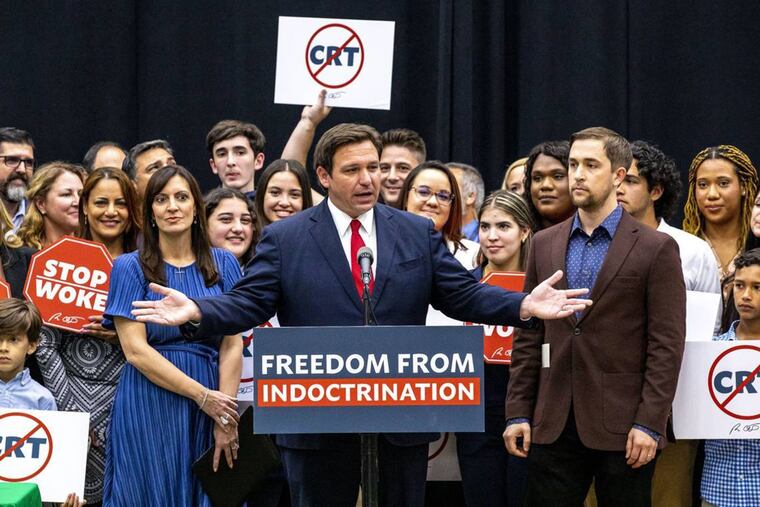Ron DeSantis is right: DEI programs are a bad idea
Diversity, equity, and inclusion programs at colleges and universities are often money-wasters that stifle academic freedom. On that, the Florida governor and I can agree.

Ron DeSantis is right.
Not about critical race theory, a mostly imaginary bogeyman that the Florida governor and other GOP propagandists claim is infecting our classrooms. Not about Advanced Placement African American Studies, which DeSantis falsely dismissed as “indoctrination” and barred from Florida schools. And he’s certainly not right about the state’s recently passed “Stop Woke Act,” which a federal judge called “positively dystopian” for restricting what teachers can say about racism and sexism.
But DeSantis is right about some of what happens under the banner of diversity, equity, and inclusion (DEI) at our colleges and universities. And we shouldn’t shy away from admitting that, simply because Ron DeSantis is saying it.
At a recent news conference, DeSantis announced plans to defund “DEI bureaucracies” at Florida’s public institutions of higher education. He said these offices cost “a lot of money” and are “hostile to academic freedom.”
He’s correct, on both counts.
A survey commissioned by DeSantis in December found that the DEI apparatus at the University of Florida and the University of South Florida cost taxpayers $750,000 and $1.1 million each year, respectively. At the University of Central Florida, the vice president for DEI and their assistant are paid $445,000 annually.
These officials are part of the elaborate network of administrators that Carleton College scholars Amna Khalid and Jeffrey Snyder call “DEI Inc.” (Full disclosure: Snyder is my former graduate student.)
Like all decent-minded professors, Khalid and Snyder want our colleges and universities — many of which were formerly restricted to white men — to assist underrepresented ethnic and racial groups, and to make all of us more aware of the irreducible diversity of our nation and world. Too often, however, that’s not what DEI Inc. does. Instead of helping our students, it makes honest academic dialogue impossible.
Look no further than recent events at Hamline University in Minnesota, where an art history lecturer was dismissed for showing her class an image of the Prophet Muhammad. When a Muslim student complained, the school’s associate vice president of inclusive excellence deemed the professor’s exercise “undeniably inconsiderate, disrespectful, and Islamophobic.” Later, the same official and the school’s president declared that “respect for the observant Muslims in that classroom should have superseded academic freedom.”
Never mind that Islamic scholars and artists have defended pictorial depictions of the prophet. A student was offended, the DEI machinery snapped into gear, and academic freedom fell by the wayside — just as Ron DeSantis predicted.
DeSantis was also correct to target diversity trainings, another highly dubious practice of DEI Inc. Diversity trainings are designed to help staff become more aware of human differences in the workplace and less likely to exhibit negative attitudes and behaviors toward others. But according to sociologists Frank Dobbin and Alexandra Kalev, who analyzed over 800 companies that sponsored diversity trainings over three decades, most of them “failed spectacularly” to reduce bias. Instead, the trainings can often reinforce the same negative attitudes they were designed to diminish.
But you’ll rarely hear mention of that on our campuses. On matters like COVID-19 vaccines and climate change, we routinely (and appropriately) invoke “science” against the myths of “denialists.” But when it comes to diversity training programs, we’re only too happy to ignore — or to deny — the science about them.
Nor has there been a serious effort to counter mandatory diversity statements, a newly ubiquitous feature of the higher-education hiring process that DeSantis has also targeted. When you apply for a faculty position, you’re often required to document how your research and teaching advance diversity, equity, and inclusion.
But that’s a kind of loyalty oath, which should be anathema to anyone who cares about open expression in education. Suppose an applicant’s diversity statement repeated some of my own concerns about the effectiveness of DEI Inc. The application would probably go straight into the trash can, which is why most people who share these worries keep their big mouths shut.
That can’t be good for diversity, equity, and inclusion, which could only benefit from a full and free debate about them. But DEI Inc. encourages all of us to say the right words, no matter what we really think. It’s a formula for cynicism, not education.
And it also gives ammunition to DeSantis, whose attacks on schools and universities seem calculated to advance his bid for the presidency. His false statements about other educational issues ― including the baseless insinuation that teachers are “grooming” students for sexual abuse — make it tempting to reject everything he says, even when it’s true. But that’s cynical, too.
There are serious problems with DEI Inc. We won’t solve them by circling the wagons praising DEI and cursing Ron DeSantis.
Jonathan Zimmerman teaches education and history at the University of Pennsylvania. He is the author of “Whose America?: Culture Wars in the Public Schools,” which was recently published in a revised 20th-anniversary edition by the University of Chicago Press.